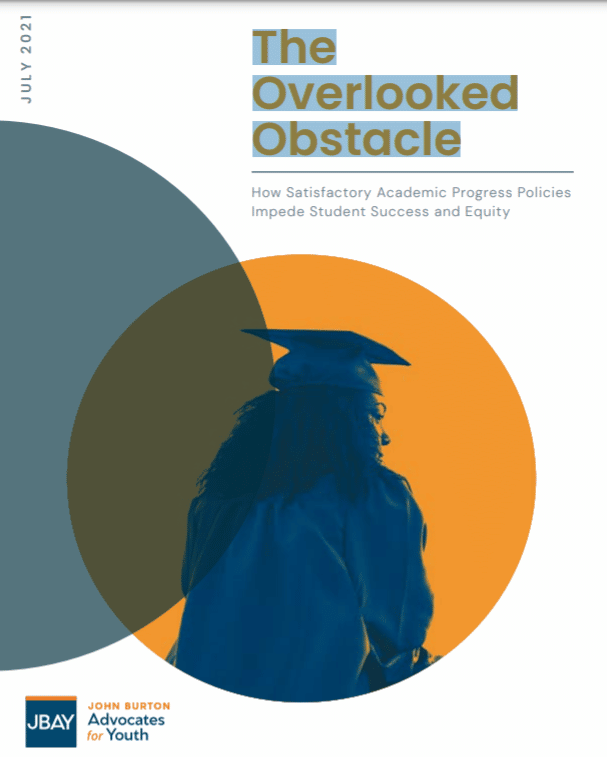our work - education
Expanding Financial Aid
As the cost of college has risen over time, the availability of financial aid has not kept pace, making it harder for students who have experienced foster care or homelessness to succeed.
JBAY has been at the forefront of developing innovative solutions to expanding the amount of funding available for these students so that they can be successful college students.
In addition, an estimated 600,000 students at California’s colleges and universities risk losing access to financial aid because they do not meet Satisfactory Academic Progress (SAP) requirements. JBAY has fought for policy changes that make it easier for foster youth and students experiencing homelessness to maintain their financial aid in the face of academic struggles.
Satisfactory Academic Progress
Every year, hundreds of thousands of students in California’s colleges and universities lose access to financial aid because they do not meet Satisfactory Academic Progress (SAP) requirements. While much attention has been paid to the need to expand financial aid access at the beginning of a student’s academic career, virtually no attention is given to whether students are subsequently able to maintain financial aid once enrolled. Colleges offer the opportunity to appeal the loss of financial aid due to SAP, but appeals processes vary tremendously by campus. In 2020, JBAY sponsored Assembly Bill 2416 (AB 2416), which requires colleges to consider homelessness as an extenuating circumstance when evaluating appeals for the loss of financial aid.
In July 2021, JBAY released groundbreaking research on the impact of SAP requirements, which found that one in four of California’s incoming community college Pell Grant recipients are not making SAP for their first two consecutive terms, disqualifying them from continued access to most forms of financial aid without a successful appeal. Further, these students are disproportionately students of color and most institutions have imposed requirements beyond those required by federal law.
Resources
Maintaining Chafee Grant
JBAY advocated for the passage of Senate Bill 150 which took effect on January 1, 2020. The law allows foster youth who receive a Chafee Education and Training Voucher (ETV) to continue to receive funds for up to two years before losing access based on satisfactory academic progress standards. Prior to SB 150, funds were lost after just one year. The Chafee ETV is the only financial aid source created specifically for current and former foster youth. It provides up to $5,000 in financial aid each academic year to eligible foster youth for up to five years.
Resources
Webinars
CalGrant Expansion
In 2018, JBAY successfully advocated for new, expanded eligibility requirements for the State’s largest financial aid program, the Cal Grant, to make the program more accessible to foster youth. These changes were included in the state budget bill, Assembly Bill 1809 (AB 1809). Changes included:
- allowing foster youth to apply for an entitlement award at any point up until age 26,
- extending the maximum time to receive the grant from 4 years to 8 years, and
- extending the deadline for the CalGrant entitlement application from March 2nd to September 2nd for foster youth attending community college.
In 2021, the State Legislature further modified the CalGrant to allow foster youth to receive up to $6,000 to cover non-tuition costs such as housing, food, books and transportation. The legislature also removed age limitations for all community college students and extended the deadline to September 2 for all community college students.




